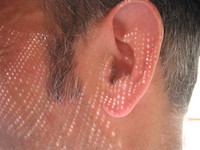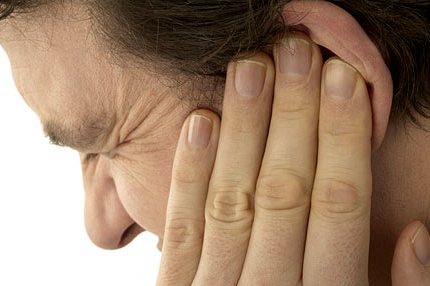Tinnitus (pronounced tin-NY-tus or TIN-u-tus) is the perception of a sound in the ear that is not actually being produced in the external, surrounding environment.
The sound is typically described as ringing, whistling, buzzing, hissing, roaring, or clicking.
It can be any high-pitched or low-pitched, soft or loud, or intermittent or continuous. Also, tinnitus can occur in each one ear or both ears.
Table of Contents
How common is tinnitus?
Over 45 million Americans have experienced tinnitus, making it an extremely common health symptom.
According to the most recent data available from the 2011-2012 National Health and Nutritional Examinations Survey conducted by the U.S. Centers for Disease Control (CDC):
- 67% of people reported having regular tinnitus symptoms for over a year
- 30% of people classified their tinnitus symptoms as a “moderate” to “very big” problem in their life
- 26% of people reported having constant or almost constant tinnitus
- 15% of people reported experiencing some form of tinnitus
What causes tinnitus?
Tinnitus is a sign that there is an issue with a patient’s auditory system. Anatomically, this includes the external and inner ear, auditory nerve that carries signals from the inner ear to the brain, and areas of the brain that process sound.
Tinnitus is not considered a disease, and in most cases is a symptom of a reaction in the brain to damage in the ear and auditory system.
While tinnitus is most often caused by noise exposure and hearing loss, there are many other causes including hundred of health disorders and also medications:
- Hearing loss: hearing loss can be age-related, as hearing deteriorates with age (typically starting around the age of 60). It typically occurs in both ears. Hearing loss can also be noise-induced, where loud noises can damage the auditory system, leading to hearing loss and possibly tinnitus. Noise-induced hearing loss can occur in one ear or both ears.
- Middle ear obstructions: obstructions in the ear canal (eg, excess ear wax, loose hair within the ear, head congestion, dir, or foreign objects) can cause pressure to build-up in the inner ear, which in turn impacts the functioning of the eardrum.
Also, anything touching the eardrum directly can cause irritation. Disruptions or damage to the eardrum can lead to tinnitus symptoms. - Head and neck injury: severe trauma to the head and neck can lead to nerve damage, muscle injury, or disruption in blood flow can lead to tinnitus. Patients with tinnitus as a result of head and neck trauma often have worse symptoms and greater variability in sound, frequency, and location of their tinnitus.
- Temporomandibular joint (TMJ) disorder: the TMJ is located in front of the ears and connects the lower jaw to the skull. Patients with damage to the TMJ experience symptoms such as pain in the jaw and/or face, popping sounds from the jaw while chewing or talking, or limited jaw mobility.
As the TMJ is adjacent to the auditory system and shares some nerve connections with middle ear structures, TMJ disorder can also lead to tinnitus. - Sinus pressure and barometric trauma: sinus pressure as a result of nasal congestion from cold, flu, or sinus infection can increase pressure in the middle ear.
Abnormal pressure in the ear can also result from trauma due to rapid and/or extreme changes in air or water pressure (eg, from scuba diving, snorkeling, flying, or explosive blasts). - Traumatic brain injury: traumatic brain injury may result in damage to the areas of the brain where auditory processing occurs, which may lead to tinnitus symptoms.
This is a major cause of tinnitus among the military and veteran populations. Interestingly, traumatic brain injury accounts for about 60% of the causes of tinnitus diagnosed by the U.S. Veterans Administration. - Ototoxic drugs: ototoxic means causing toxicity or harm to the ear, and many prescription drugs are ototoxic.
Tinnitus is a potential adverse effect of a variety of different drugs.
In most cases, tinnitus caused by ototoxic drugs is acute and goes away if the patient stops taking the drug. There are, however, drugs that may cause more permanent tinnitus symptoms: non-steroidal anti-inflammatory drugs (NSAIDs; eg, ibuprofen or naproxen), certain antibiotics (eg, vancomycin or erythromycin), water pills/loop diuretics (eg, furosemide), certain cancer medications, and quinine-based medications.
* For more information, click here for my article on medications that cause tinnitus.
*Patients who are concerned about tinnitus as a result of their prescription medications should not stop taking their medication without first consulting their doctor/healthcare provider.
How can You Improve your Hearing? Is this Possible To Improve at Home? Professional Advice
Other medical conditions tinnitus has been a reported symptom of include:
Metabolic disorders (hypothyroidism, hyperthyroidism, anemia), autoimmune disorders (lyme disease, fibromyalgia), cardiovascular disease (high blood pressure, atherosclerosis), psychiatric disorders (depression, anxiety, stress), and vestibular disorders (otosclerosis, thoracic outlet syndrome).
What are the risk factors?
Historically, tinnitus has shown to be more common in patients of male gender, older age (with a peak between the ages of 60-69), or white, non-hispanic ethnicity.
Best Tinnitus Maskers: Sound Therapy Options for Tinnitus Relief
Notable groups of people that are at particularly high risk for developing tinnitus include:
- Elderly: about 30% of elderly people experience tinnitus. After the age of 60, hearing loss becomes more common, and as aforementioned, hearing loss is a main cause of tinnitus.
- Military personnel and veterans: exposure to explosives, gunfire, and loud machinery increases risk of noise-induced hearing loss, which man in turn lead to tinnitus.
- People with loud workplace environments: workers in construction, mining, agriculture, manufacturing, and transportation are at high-risk for noise-induced hearing loss and subsequent tinnitus.
- Musicians; music, motorsports, hunting enthusiasts: noise-induced hearing loss can lead to tinnitus in people who spend a lot of time in these hobbies.
- Medical history of behavioral/mental health problems: having a history of anxiety, depression, and/or obsessive-compulsive disorder (OCD) may make patients who develop tinnitus experience worse tinnitus symptoms.
How is tinnitus diagnosed?
Patients who suspect they may have tinnitus should first see their primary care physician (PCP).
The PCP will check for any obstructions in the middle ear and also ask about the patient’s current health and symptoms, past medical history, and current medications to see if there are any underlying causes of tinnitus.
If the PCP cannot identify an underlying cause of a patient’s tinnitus, they may refer the patient to an otolaryngologist (or an ear, nose, and throat [ENT] doctor) to conduct further examinations of the head, neck, and ears and also possibly a hearing test. Patients may also be referred to an audiologist for a hearing test and further evaluation.
Patients may not always know that they are experiencing hearing loss and therefore have hearing damage.
Therefore, specialists such as audiologists play an especially important role as they are able to perform sensitive audiometric tests to more accurately assess for and measure hearing loss.
How is tinnitus treated?
A scientifically proven cure is currently not available for tinnitus. However, there are a variety of methods used to help treat symptoms and reduce a patient’s tinnitus burden to allow them to live a more comfortable and peaceful life.
Treatment approaches for addressing tinnitus symptoms include:
- Maintaining overall health: severity of tinnitus symptoms can fluctuate, depending on various factors including a patient’s general health.
Maintaining good overall health may not impact the underlying cause of tinnitus, but it can provide benefits that make living with tinnitus easier. This includes a healthy diet, physical activity, social activity, and recreational activity and hobbies. - Behavioral therapy: the burden of living with tinnitus can lead to depression, anxiety, and anger in some patients. Behavioral therapy can help patients learn to control their emotional responses to tinnitus and help them disassociate tinnitus from their negative reactions.
- Drug therapy: currently, there are no FDA-approved medications for the treatment of tinnitus. However, prescriptions drugs may help with treating stress, depression, or anxiety that patients may develop due to tinnitus.
- Hearing aids: hearing aids can help patients to better hear external noises, which can help to mask the internal sounds they hear as a result of tinnitus.
According to a 2007 survey conducted by hearing care professionals, approximately 60% of tinnitus patients experienced at least some relief when using hearing aids, and about 22% of patients experienced significant relief. - Sound therapy: sound therapy can be used to create external noises that mask the internal sound of tinnitus. Patients can use almost any sound-producing device, including TVs, radios, mp3 players, and there are even sound and sleep apps available.
Many agree that sound machines help with tinnitus symptoms, as they are specifically made for this purpose and come with preset sounds that can even be played on a non-stop loop. To learn more about sound therapy and the best tinnitus maskers, click here.
References
- National Institute of Health: National Institute on Deafness and Other Communication Disorders (NIDCD). Tinnitus. https://www.nidcd.nih.gov/health/tinnitus. Updated March 6, 2017. Accessed January 2022.
- MedlinePlus. Tinnitus. https://medlineplus.gov/tinnitus.html. Reviewed August 30, 2017. Accessed January 2022.
- ENT Health. American Academy of Otolaryngology-Head and Neck Surgery. Tinnitus. https://www.enthealth.org/conditions/tinnitus/. Reviewed August 2018. Accessed January 2022.
- American Tinnitus Association. Causes. https://www.ata.org/understanding-facts/causes. Accessed January 2022.
- American Tinnitus Association. Demographics. https://www.ata.org/understanding-facts/demographics. Accessed January 2022.


